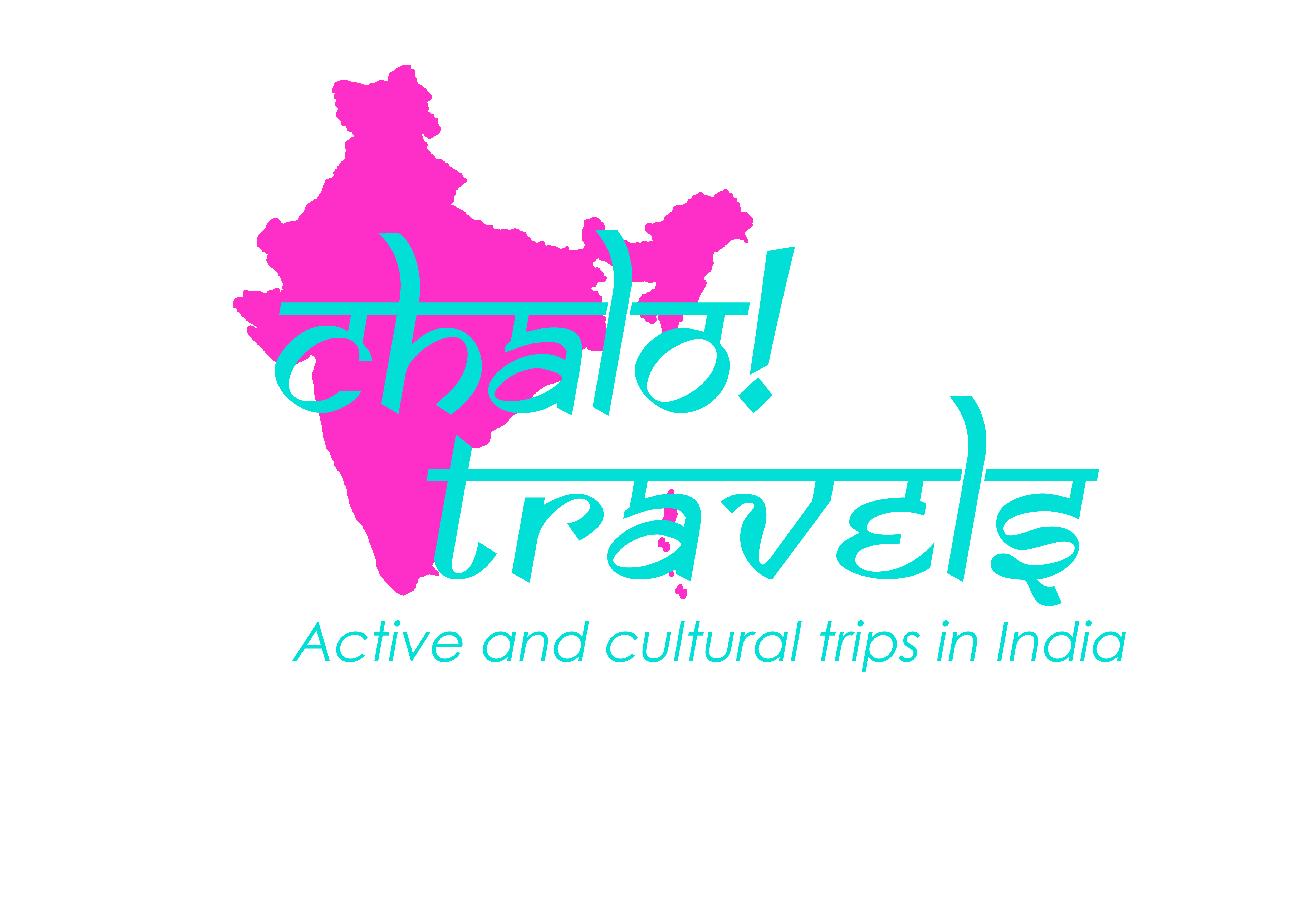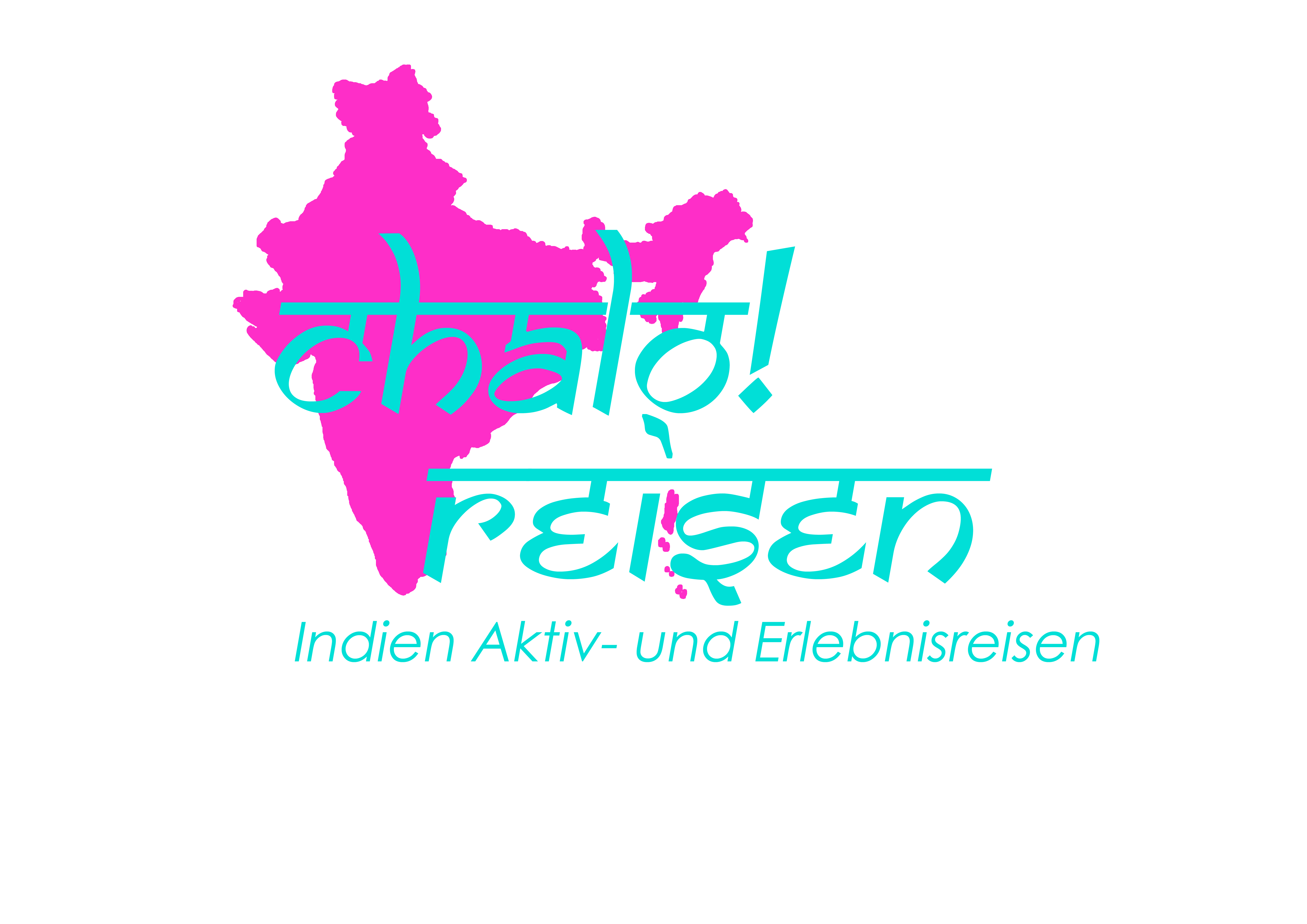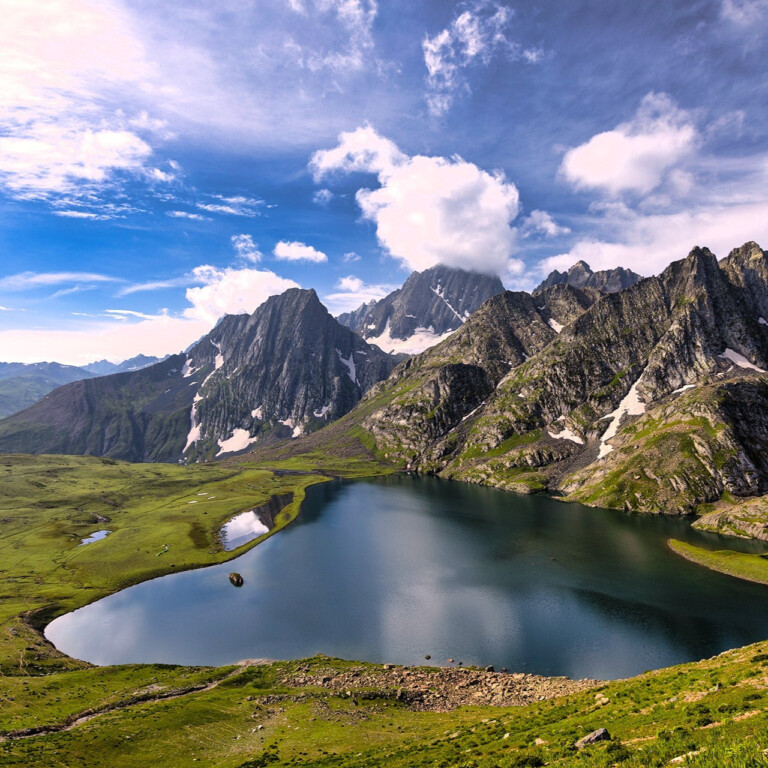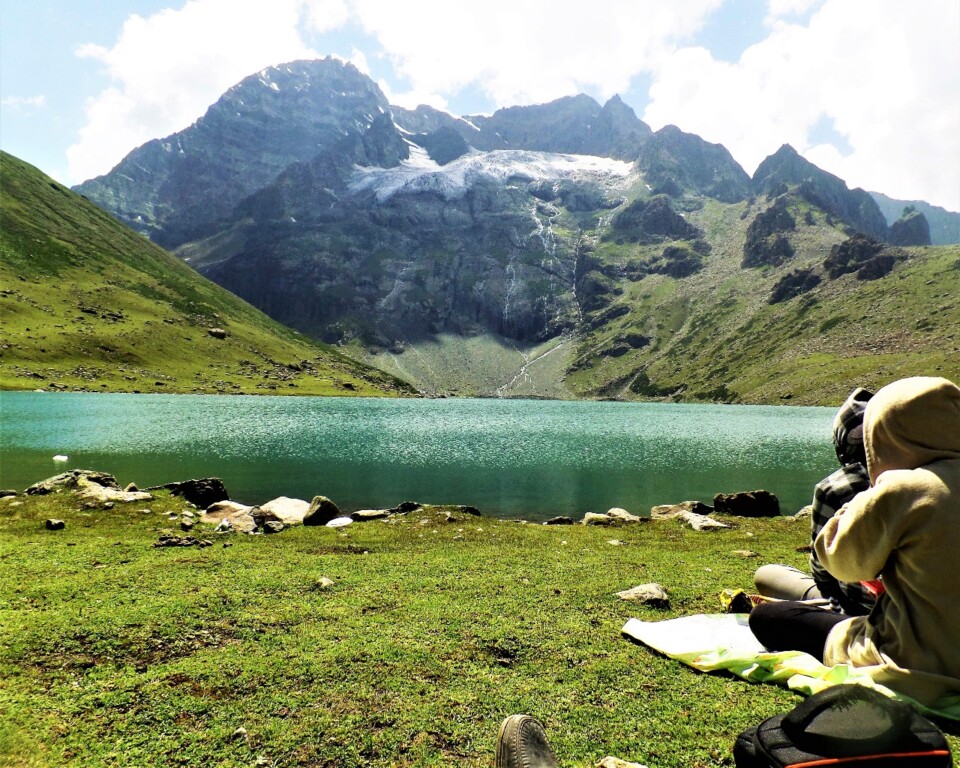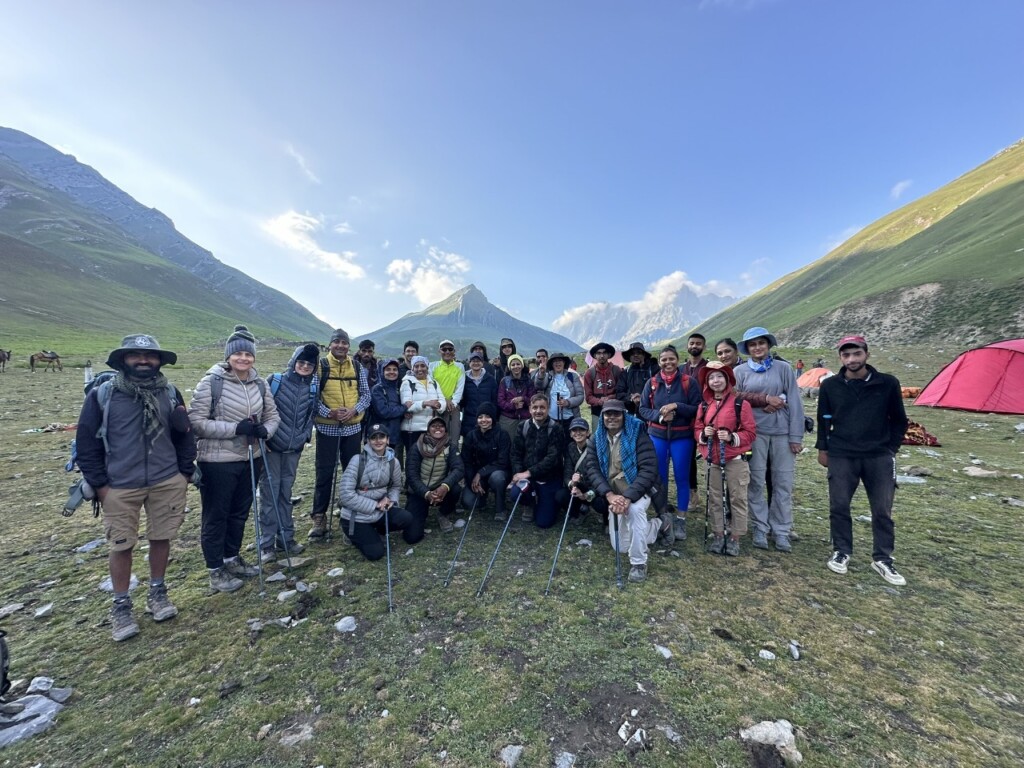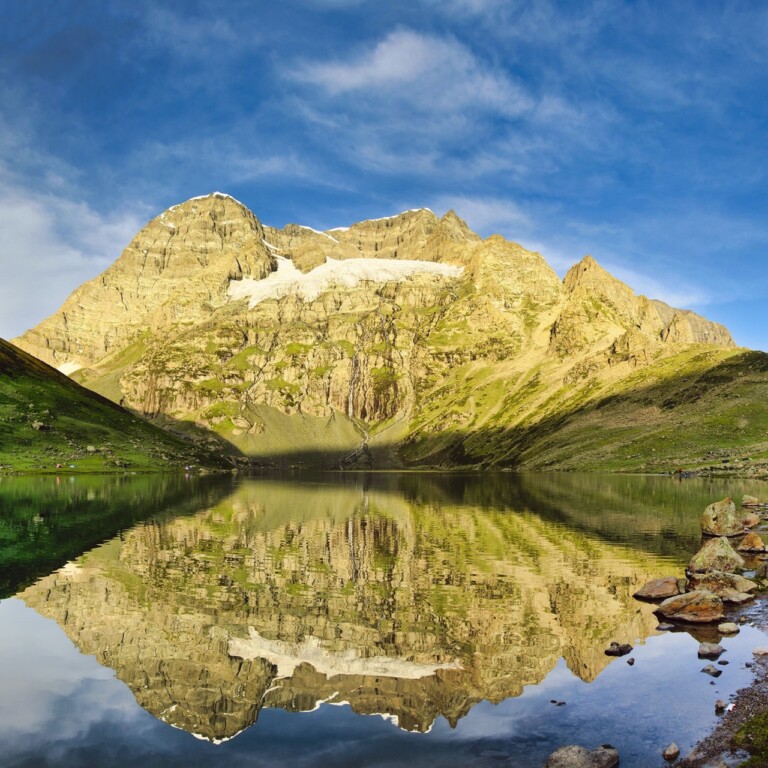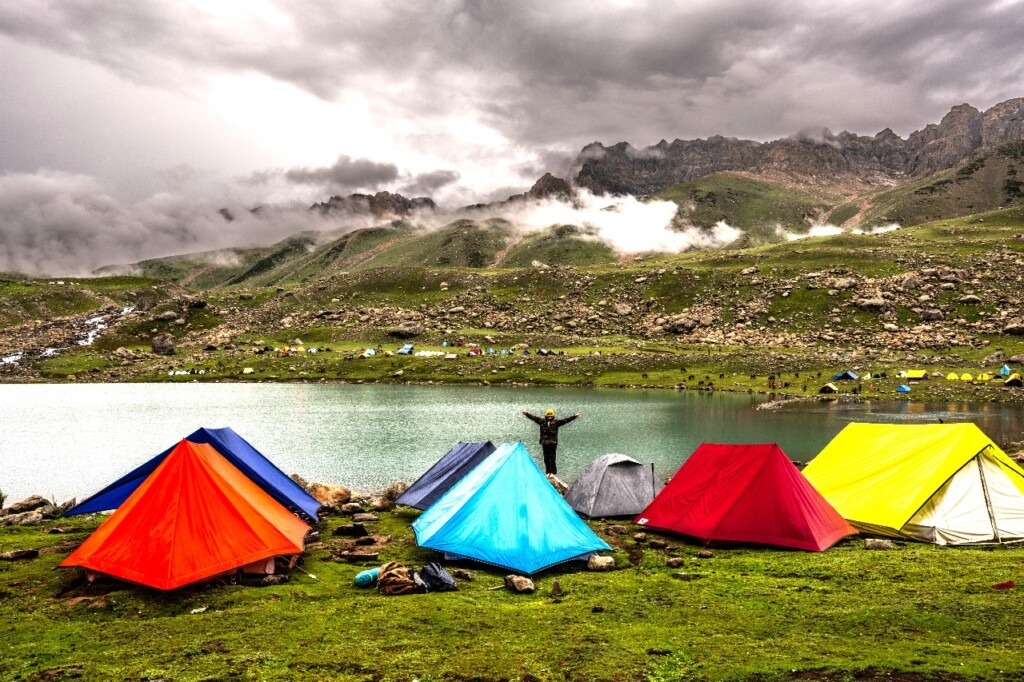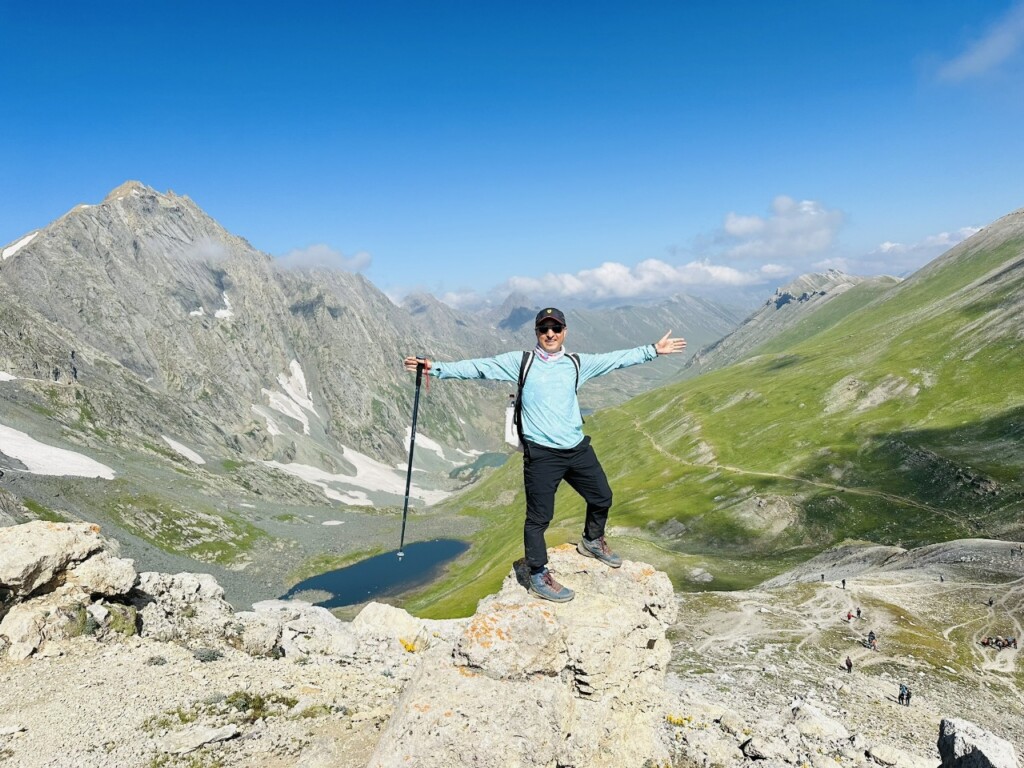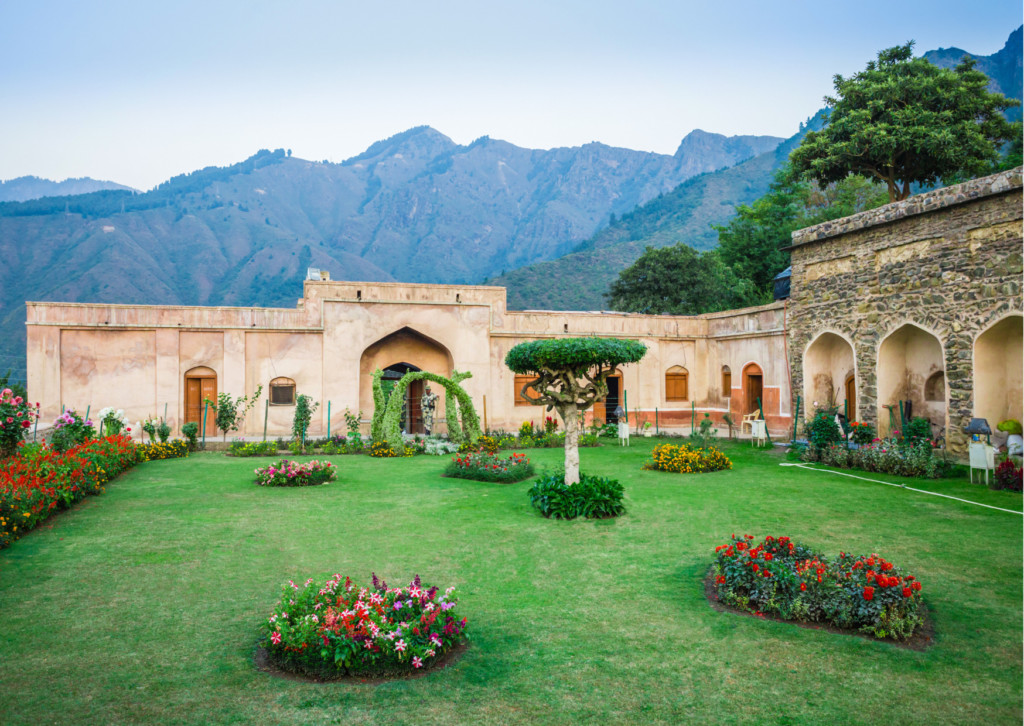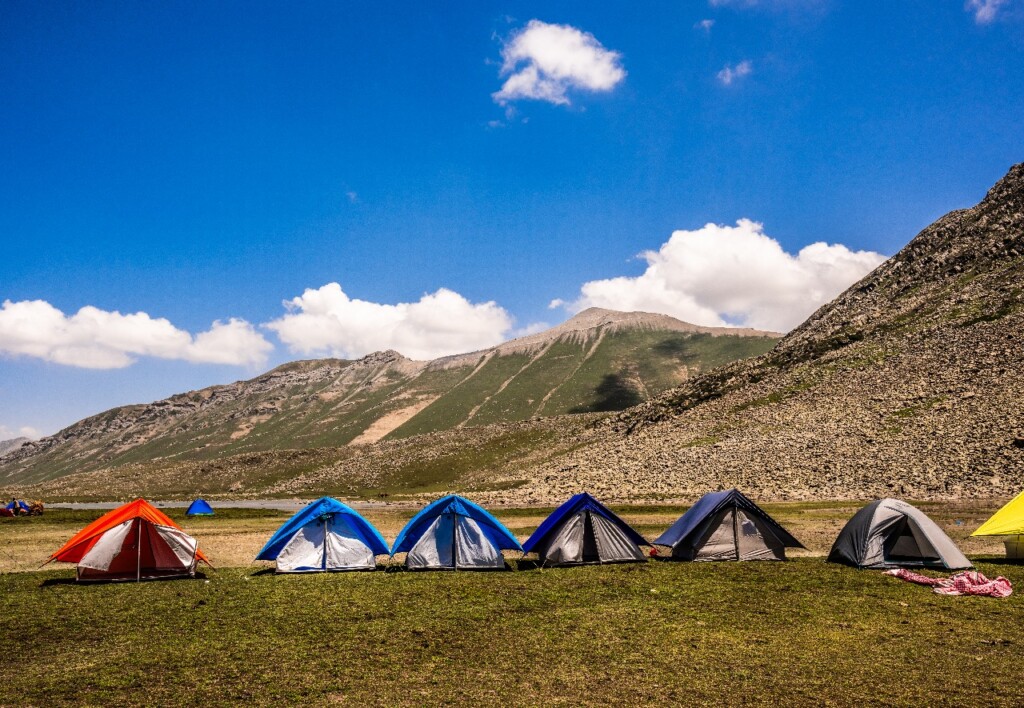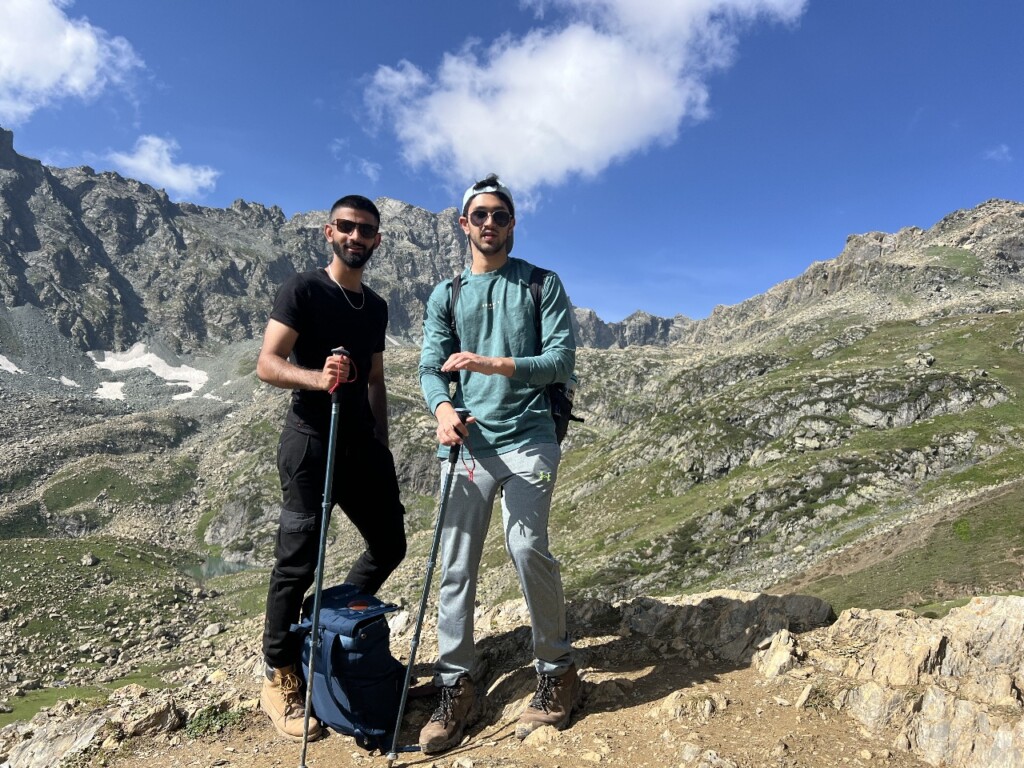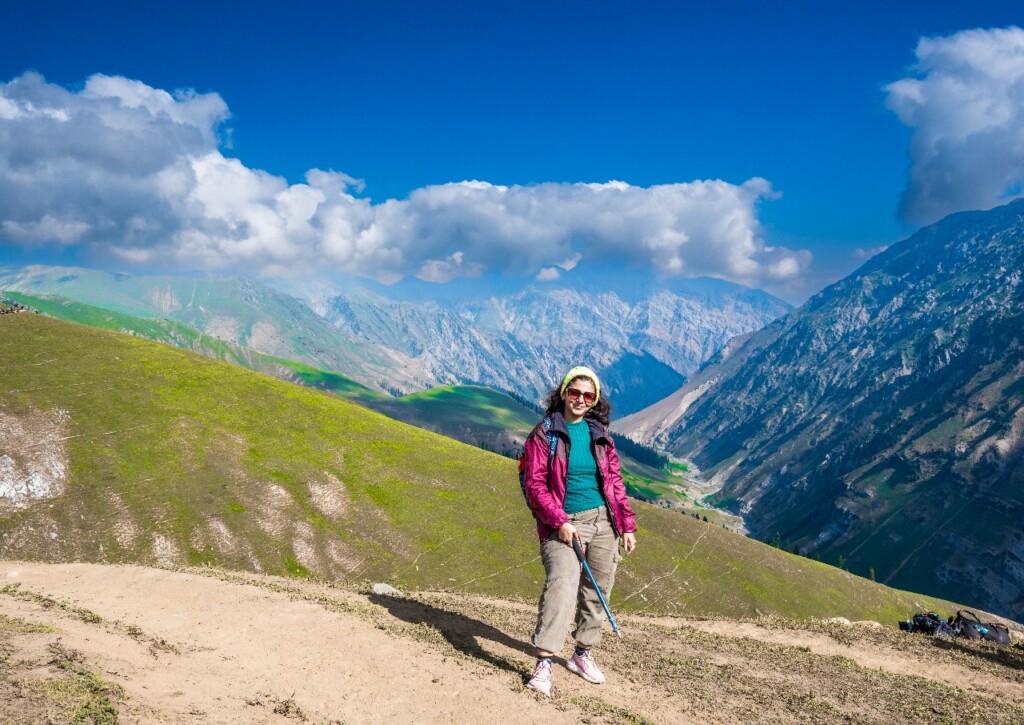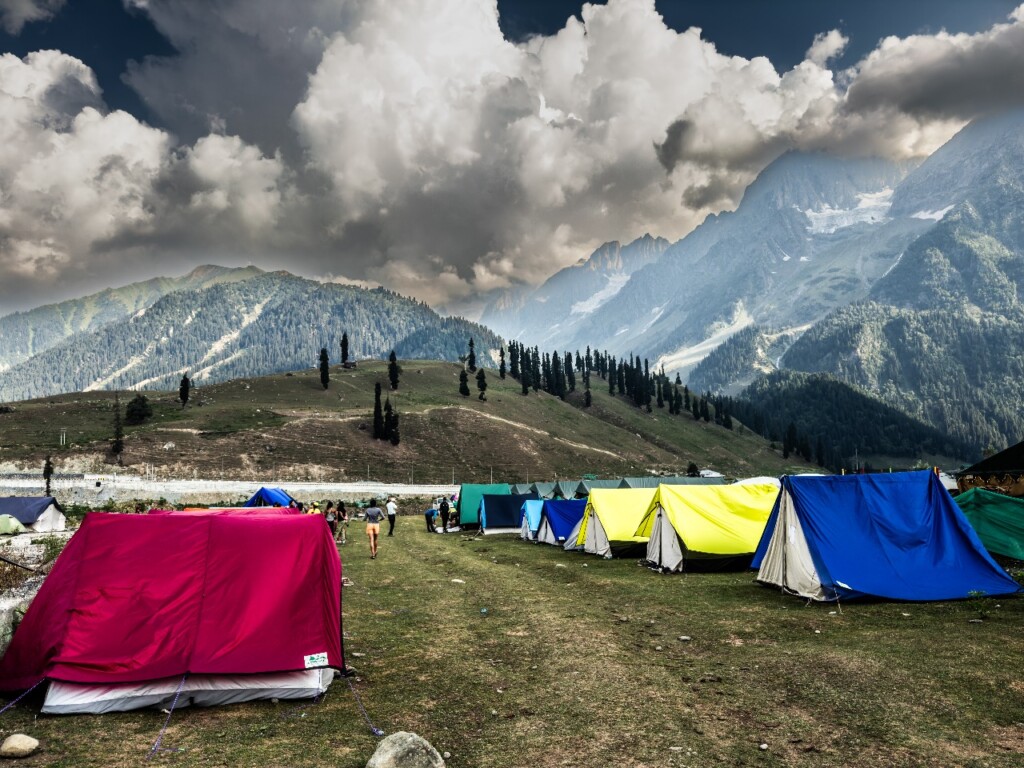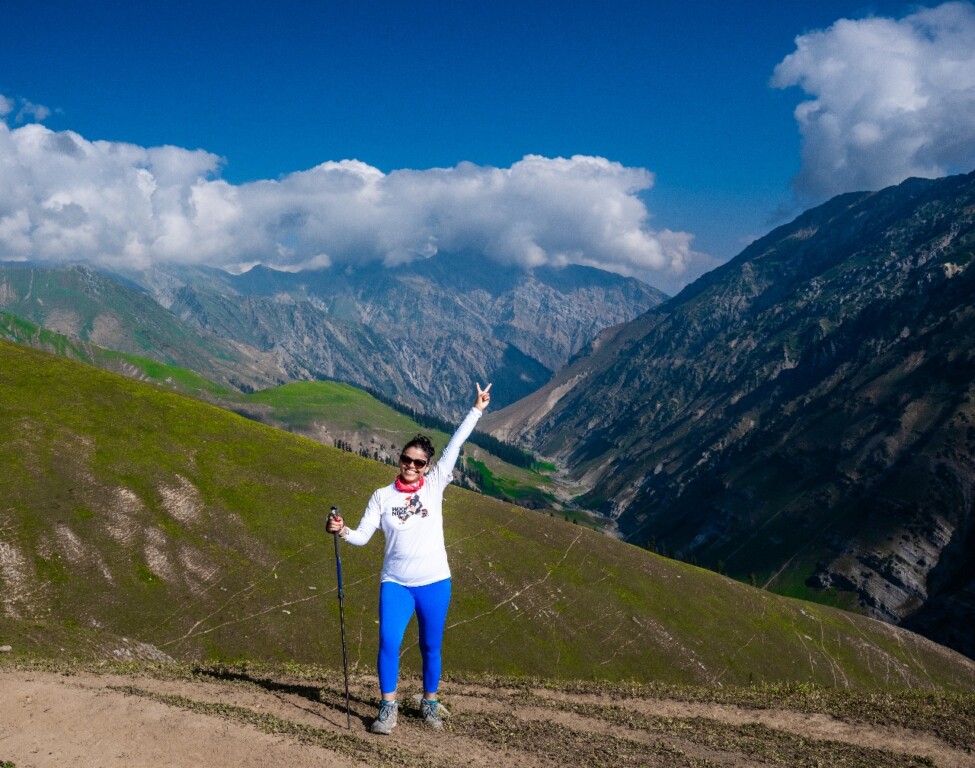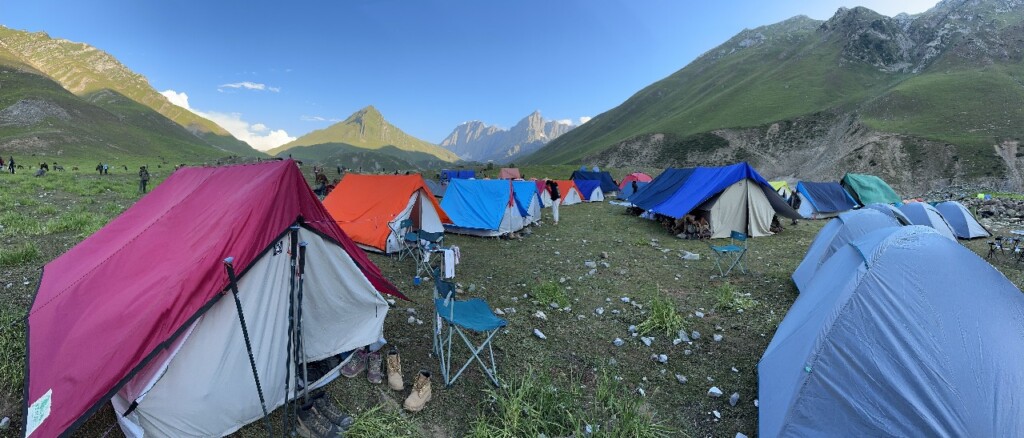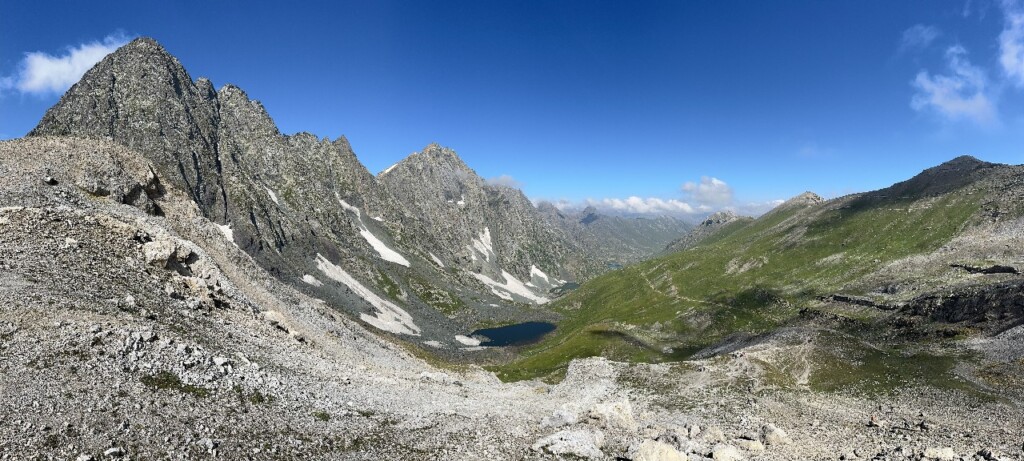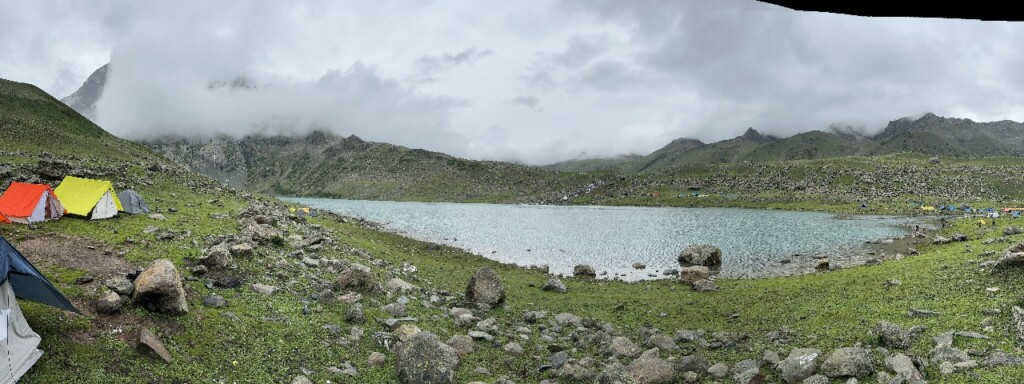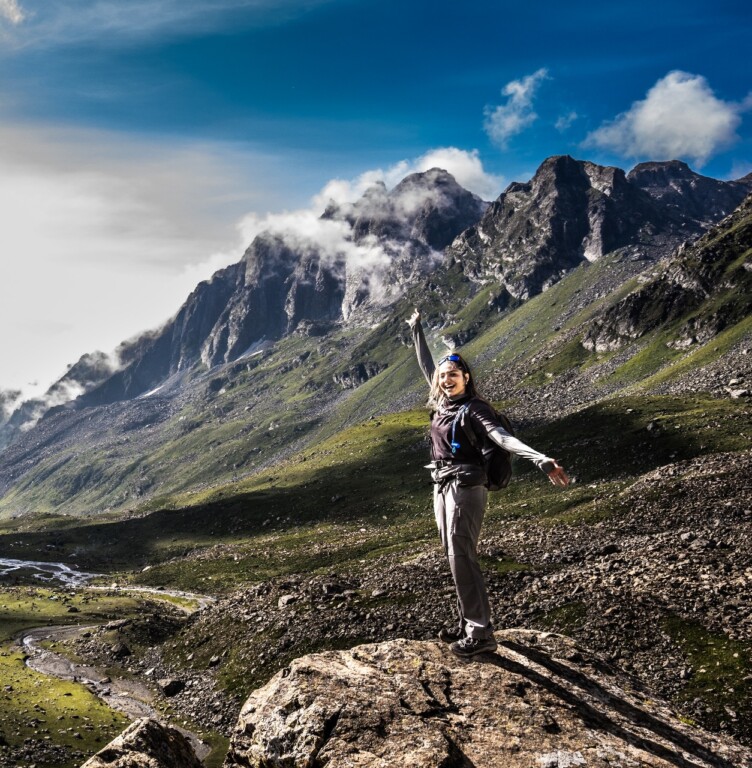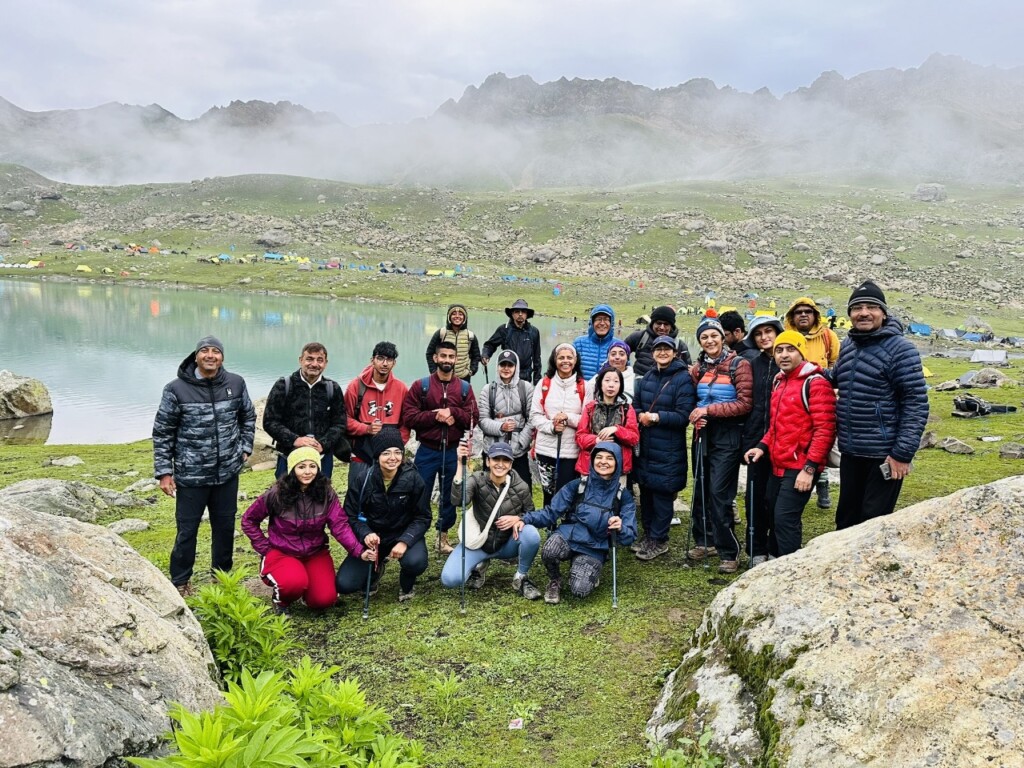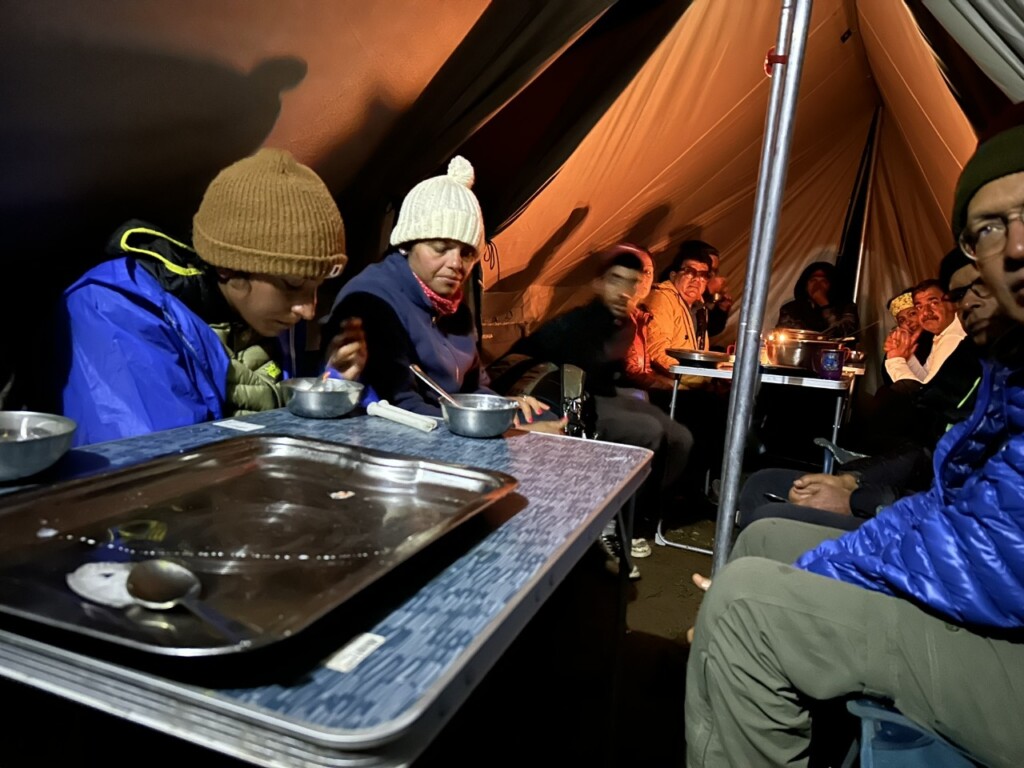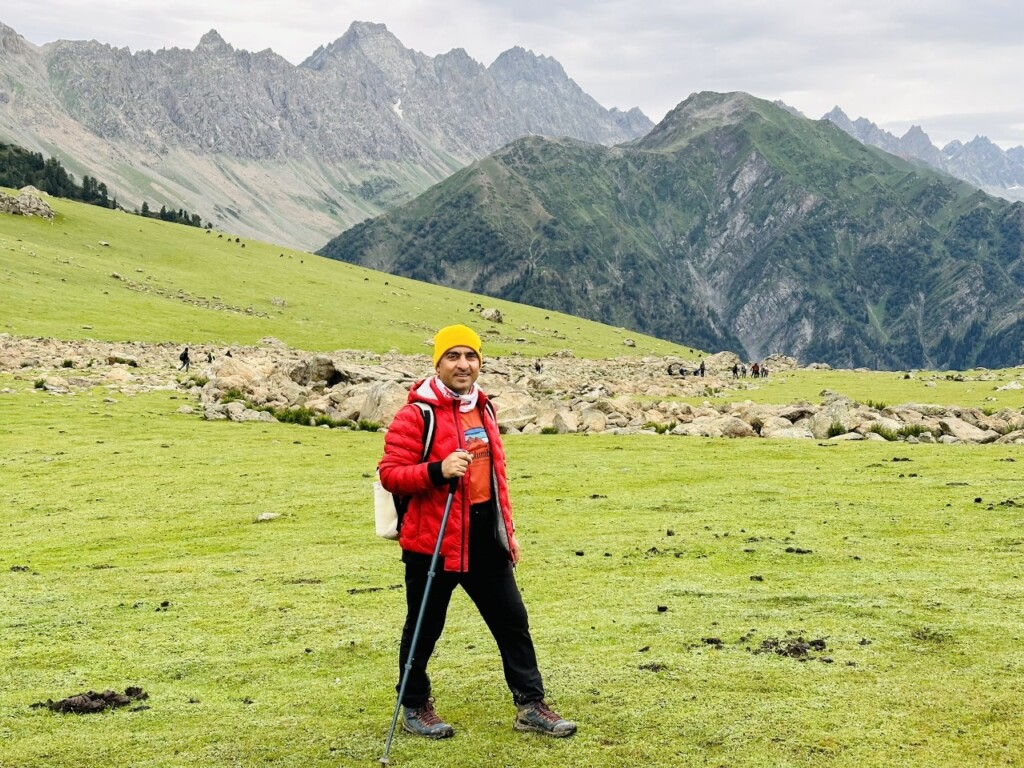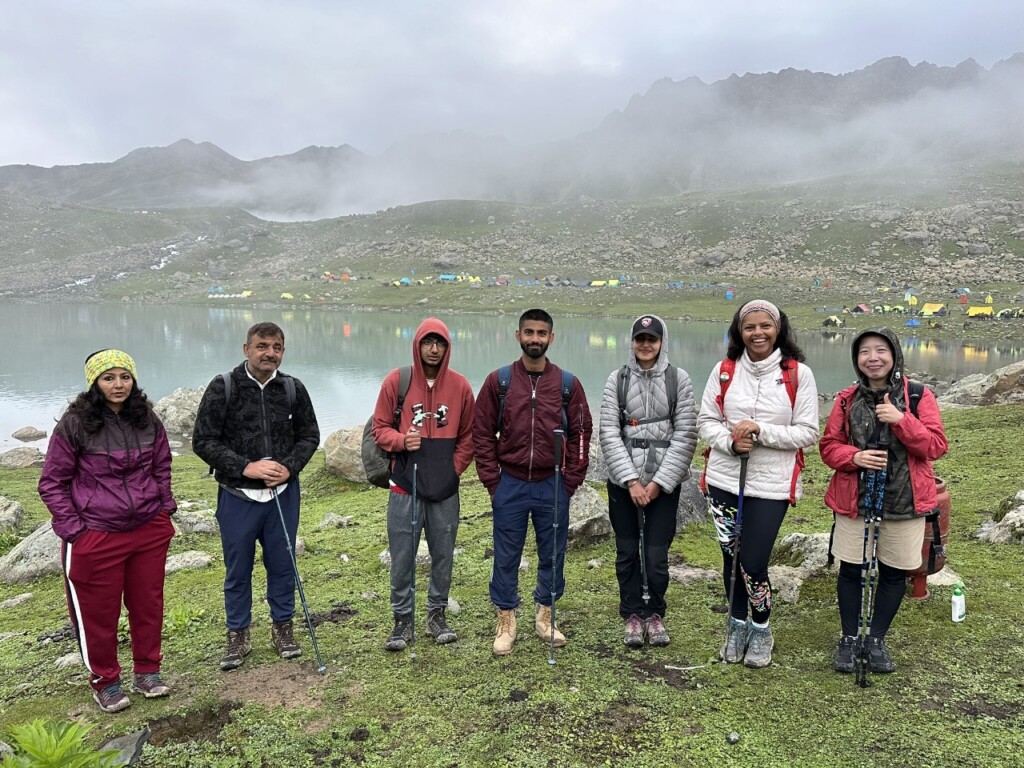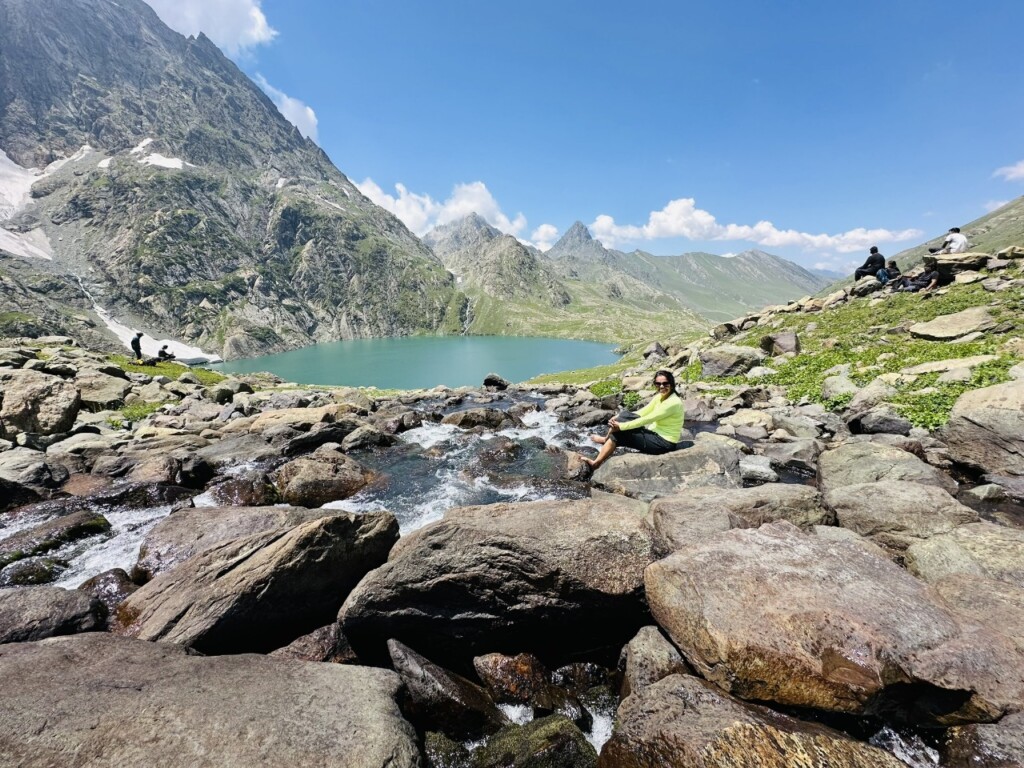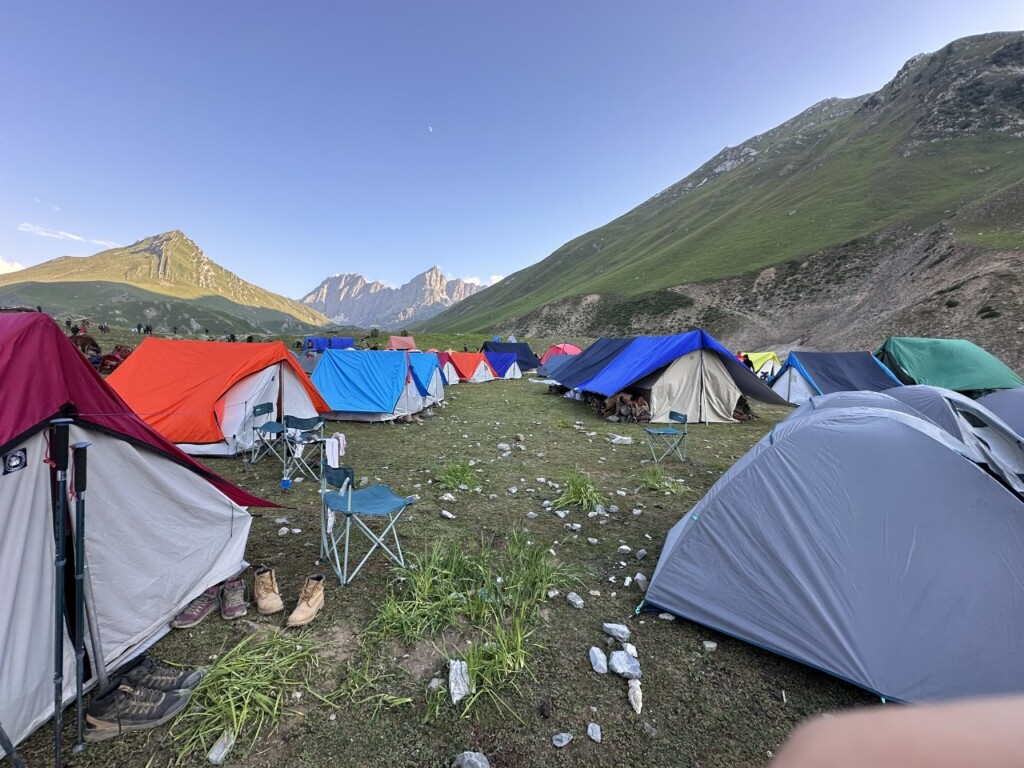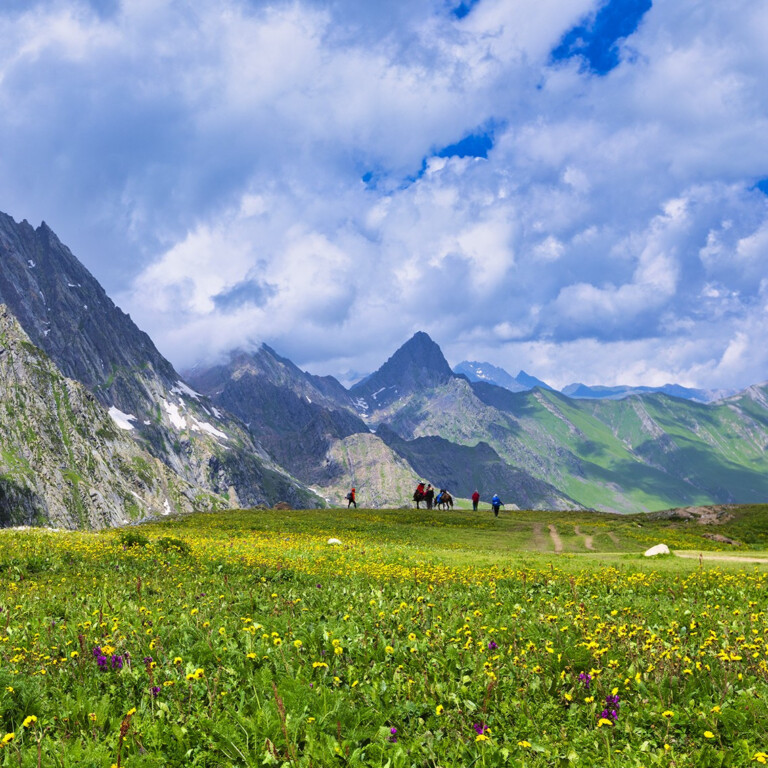- Sport & Abenteuer Reisen
- Trekking Reisen
Overview
Explore the Untamed Beauty of Kashmir’s Alpine Lakes
Embark on an extraordinary 15-day trekking adventure through the breathtaking valleys and pristine alpine lakes of Kashmir. The Ultimate Great Lakes Traverse is a once-in-a-lifetime journey that combines the stunning Tarsar Marsar trek with the famous Great Lakes trek. This immersive experience takes you through lush meadows, towering mountain passes, crystal-clear glacial lakes, and remote nomadic settlements. Witness Kashmir’s most spectacular landscapes while staying in comfortable tented camps under the starry skies.
Kashmir
The region is surrounded by majestic mountains, green valleys and clear lakes. The foothills of the Himalayas stretch across the entire region, offering spectacular views of the surrounding peaks. The bonus: The monsoon rains do not reach this far!
The tradition and culture of Kashmir are characterized by their diversity and uniqueness. The region has experienced a mixture of Hindu, Buddhist and Islamic influences throughout history, which are expressed in the region’s art, music and architecture. Kashmiri craftsmanship is known worldwide for its high quality products made of wood, ceramics and especially cashmere wool. Kashmiri cuisine is known for its rich aromas and flavors created through the use of spices such as saffron, cinnamon and cardamom. The people of Kashmir are known for their hospitality and warmth, and their traditional festivals and celebrations are colorful and lively.
Srinagar
The journey starts in Kashmir’s capital Srinagar. The town is located on the shore of the picturesque Dal Lake and is surrounded by mountains and hills. Srinagar is known for its beautiful gardens such as the Shalimar Bagh and Nishat Bagh, which were created by the Mughal rulers in the 17th century. Another highlight of Srinagar is the floating gardens, a unique attraction where vegetables and flowers are grown on floating islands on Dal Lake. The city is also known for its traditional handicraft products made of wood, ceramics and cashmere wool, which are sold in local markets.
Program
Day 1: Arrival in Srinagar – Stay at Hotel Ash Vale, Nishat
Upon arrival at Srinagar Airport, you will be transferred to Hotel Ash Vale in Nishat. After check-in, there will be a trek briefing and a gear check. You will also have the option to explore the famous Dal Lake and Mughal gardens. Enjoy a delicious dinner at the hotel before resting for the night.
Day 2: Drive from Srinagar to Aru (2,400m) – Trek to Lidderwat (2,780m)
After breakfast, we drive through scenic landscapes via Pahalgam to reach the charming village of Aru. From here, the trek begins as we follow the Lidder River, passing through lush meadows and alpine forests. The day ends with a night of camping in the serene surroundings of Lidderwat.
Day 3: Trek from Lidderwat to Tarsar Lake (3,800m)
Today, we gradually ascend through the enchanting meadows of Shekwas, leading to the mesmerizing Tarsar Lake. The turquoise waters of the lake create a breathtaking reflection of the surrounding peaks. Camp is set up near the lake, where we enjoy a peaceful night under the stars.
Day 4: Trek from Tarsar Lake to Sundarsar via Tarsar Pass (4,000m)
We begin the day with a steep climb over Tarsar Pass, offering panoramic views of the valleys below. Descending into the Sundarsar region, we witness frozen streams and an abundance of wildflowers. We set up camp near the tranquil Sundarsar Lake for the night.
Day 5: Trek to Marsar Lake and return to Sundarsar (4,100m)
An early morning trek takes us to the mystical Marsar Lake, often covered in mist. The scenic reflections on the water, surrounded by towering cliffs, make this a picture-perfect moment. After exploring the lake, we return to our campsite at Sundarsar.
Day 6: Trek from Sundarsar to Sonmasti (3,600m)
We descend through rocky terrain and green pastures, encountering nomadic settlements along the way. The day ends with a comfortable camp setup in Sonmasti, where we enjoy a warm meal and rest for the night.
Day 7: Trek from Sonmasti to Surfraw, Sumbal – Drive to Sonamarg
Our final descent of the Tarsar Marsar section takes us through lush valleys and glacial streams before reaching the village of Surfraw. From here, a scenic drive takes us to Sonamarg, where we check into a comfortable guesthouse for the night.
Day 8: Trek from Sonamarg to Nichnai (3,500m)
The Great Lakes Traverse begins with a gradual ascent through dense pine forests and meadows blooming with wildflowers. The day concludes with an overnight camp at Nichnai, surrounded by stunning natural beauty.
Day 9: Trek from Nichnai to Vishansar Lake via Nichnai Pass (4,050m)
We climb up to Nichnai Pass, offering breathtaking views before descending towards the emerald-green Vishansar Lake. The tranquil surroundings and the reflection of Himalayan peaks on the water make this one of the most scenic spots on the trek.
Day 10: Trek from Vishansar to Gadsar via Gadsar Pass (4,200m)
Today’s trek is challenging as we ascend to the highest point of the trek, Gadsar Pass. The pass offers panoramic views of the snow-capped peaks before we descend to the deep-blue waters of Gadsar Lake. We set up camp near the lake for the night.
Day 11: Trek from Gadsar to Satsar Lakes (3,600m)
A relatively moderate trek takes us across rolling meadows and rocky moraines, leading to the Satsar Lakes—a stunning group of seven interconnected glacial lakes. Our campsite is set near these pristine waters.
Day 12: Trek from Satsar to Gangbal via Zajibal Pass (4,000m)
A steep climb takes us over Zajibal Pass, revealing breathtaking views of Gangbal and Nundkol Lakes—the largest alpine lakes in Kashmir. As we descend, we reach our campsite near Gangbal Lake.
Day 13: Rest and Exploration at Gangbal Lake
A relaxing day to enjoy the beauty of Gangbal Lake. Activities include short hikes, fishing, photography, or simply soaking in the serenity of the surroundings. Another peaceful night is spent at our lakeside camp.
Day 14: Trek from Gangbal to Naranag – Drive to Srinagar
We make our final descent through dense pine forests towards Naranag, where our trek concludes. A two-hour drive takes us back to Srinagar, where we check into the traditional Houseboat Monalisa on Dal Lake. A relaxing evening includes a Shikara boat ride and a farewell dinner.
Day 15: Departure from Srinagar
After breakfast, you will be transferred to Srinagar Airport for your onward journey, bringing this unforgettable adventure to an end.
Included services
- Accommodation: 12 nights tented, 1 night in Hotel Ash Vale, and 1 night in Houseboat Monalisa.
- Vegetarian meals: All meals included during the trek; breakfast and dinner provided at hotels.
- Transport: All ground transfers by AC Innova cars, including two-way transport to base camps.
- Trekking gear: High-quality tents, sleeping bags, mats, inflatable pillows, trekking poles, dining/kitchen tents, toilet tents, and camping furniture.
- Safety & Support: First aid kits, medical oxygen, trek permits, trek insurance.
- Experienced mountain guides, cooking staff, and horses for carrying backpacks (offloading included).
International/domestic flights and visa.Personal trekking gear and clothing.Tips for guides and local staff.Optional extras: Non-vegetarian meals, single-occupancy tents or hotel rooms, and horse rides.
Highlights
Prices and dates
best time: July and August
From 2 pax: 1100 € per person
From 4 pax: 990 € per Person
From 6 pax: 850 € per Person
Single Supplement: 150 €
Travel info
Security Situation
In Kashmir, insecurity is always looming in the form of insurgencies, conflicts with the military and attacks. At the moment, the situation is very calm and seems stable. The locals are also keen on this: The Kashmiris are happy about the steadily growing tourism. We keep ourselves informed and reserve the right to make changes in the program.
Requirements of the trek
We will climb to over 4000 meters during the trekking tour and spend the night at 3600 meters. Not only is a moderate fitness level necessary, but also the ability to acclimatize to the altitude. We will be happy to advise you before the tour what can be done in terms of preparation for the trekking tour. High altitude training prior to the trip may be recommended.
Information about trekking in the Indian Himalayas with Chalo! Travel
Mountain guide and trekking team
On all our treks we have at least one (for larger groups of 6 participants or two) trained local mountain guides. Our mountain guides have all completed at least the Indian mountaineering training, many of them have also taken part in the advanced courses.
You are familiar with the trekking routes and know the terrain excellently. Our mountain guides all speak English.
In addition, there is a local team consisting of a cook (if the group consists of only two participants, the mountain guide also takes over the tasks of the cook), helpers, horsemen with horses or Nepalese carriers, depending on the type of trek.
All our team members have been working with us for years, are very friendly and always strive to provide our guests with a great trekking experience. Their English is rather mediocre or non-existent, but this is not necessarily a hindrance to communicating with them.
Trekking routes
The trekking routes are designed for the skills of our guests and are all feasible for a person with a good fitness level, unless otherwise mentioned. The daily routes are between five and eight hours long (with breaks) and an average increase of around 500-800 metres of altitude is completed.
In between, rivers may have to be crossed or crossed. The paths are partly well developed, but sometimes also almost non-existent. On our trekking routes there are hardly any villages in between, so we will take enough food for the whole tour.
On our treks you can cross passes, snow or glaciers. On steep slopes, we have safety equipment with us.
Daily routine (Depending on the length and intensity of the trek, the times may vary)
7: 00 Get up with tea
7:30-8:30 Breakfast
7:00-9:30 a.m. Dismantling of the camp
8:00- 9:30 Start Trek
13:00 Lunch on the way
15:00-17:00 Arrival at the camp and camp construction
15:30-17:30 Snacks
19:00 Dinner
Altitude and altitude sickness
Altitude sickness is a very important topic that should not be underestimated, especially during our trekking tours in the Indian Himalayas. At altitudes above 3500 m, our body has to slowly get used to the low air pressure, which also causes less oxygen to enter our lungs. The first signs of altitude sickness are headaches, which are accompanied by dizziness, nausea, insomnia and loss of appetite. It becomes problematic when water accumulates in the lungs and brain and edema occurs. Then only the immediate descent to lower altitudes will help. To prepare for the highs on our treks, we will either spend a few nights at high altitudes before the trek or slowly ascend during the trek to acclimatize. If we notice that there are problems with our guests (each person is otherwise able to acclimatize, regardless of age, gender and fitness level), it may happen that either the entire tour group or the participant descends/returns with a team. In addition, it makes sense to take an emergency drug for altitude sickness. For this, it is best to consult the pharmacy or the travel doctor. For certain treks we will also have oxygen with us.
Luggage
Each trekking participant is responsible for his own clothes and personal belongings. Depending on the trek, we are either on the road with horses or carriers. If we have load horses, one bag per participant can be loaded onto the horse. In the case of treks with carriers, all personal luggage must be carried independently. Tents, sleeping bags, mattresses and food are carried by our porters.
For trekking tours with horses, a day backpack with space for the lunchbox, a water bottle and warm overcoat clothing should be taken with you. Here to the complete packing list for our trekking tours.
Packing list for trekking tours
- Sleeping bag (will be provided by us)
- large backpack or soft tote bag so that the pack animals can carry the luggage
- Small backpack for the day approx. 30-40 l with rain cover
- Flashlight / headlamp
- 2 refillable water bottles
- Walking sticks
- Passport and passport copy
- Camera with spare batteries and memory card
- Headgear as sun protection
- Good sunglasses
- Cap
- Scarf, buff
- gloves
- Windpants
- Trekking pants
- Functional underwear long
- Walking shoes
- Socks thick and thin
- Sneakers, sandals and / or slippers
- Windbreaker
- Warm jacket
- Fleece pullover / jacket
- Tshirts
- Sun cream, lip balm min. Protection 40
- Fat cream
- Water purification tablets
(boiled and filtered water is provided) - own medication for headaches, nausea, digestive problems, colds)
- Blister plasters and bandages
- own hygiene article
- Toilet paper
- Hand disinfection
Meals
During the trek there will be a vegetarian full catering. Water is either boiled or we have a water filter with us.
Breakfast (daily selection):
- Coffee/Tea
- Oatmeal porridge/muesli/cornflakes/Indian porridge
- Indian breakfast
- Sliced fruit/vegetables
Lunch (mostly lunchbox), sometimes warm in the camp
- Sandwiches/Indian (rice, chapati, vegetables)/potatoes
- Juices
- Fruit
Snacks
- Tea/coffee
- Cookies
- Indian snacks
Soup
Dinner
- Vegetable dish
- Lentil dish
- Rice
- Chapati
- Salad
- Dessert
Accommodation and camp
We have very comfortable and spacious two-man tents. Our mattresses are practical but simple if there are problems with sleeping on hard surfaces, please take your own mattress with you or order from us. Our sleeping bags are freshly washed and have a very good quality with comfort zone up to -5°C/extreme zone up to -20° C. It is recommended to bring personal indoor sleeping bags.
In addition, we have a spacious dining tent with tables and chairs, a kitchen tent for the team and a toilet tent. For treks up to 4 people, the kitchen tent can also act as a dining tent at the same time.
For trekking tours with porters, we will take our smaller, lighter tents with us and do without a toilet tent.
Weather
In the Himalayas, temperatures fluctuate widely. While it can get warm up to 25°C during the day and the sun is not only warming, but also very intense (sun protection is a must), it can also cool down significantly below the minus-grade at night, especially in the months end of September and October, as well as in June. There may also be weather changes with snow on the passes.
